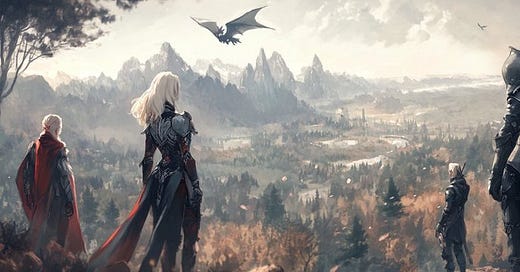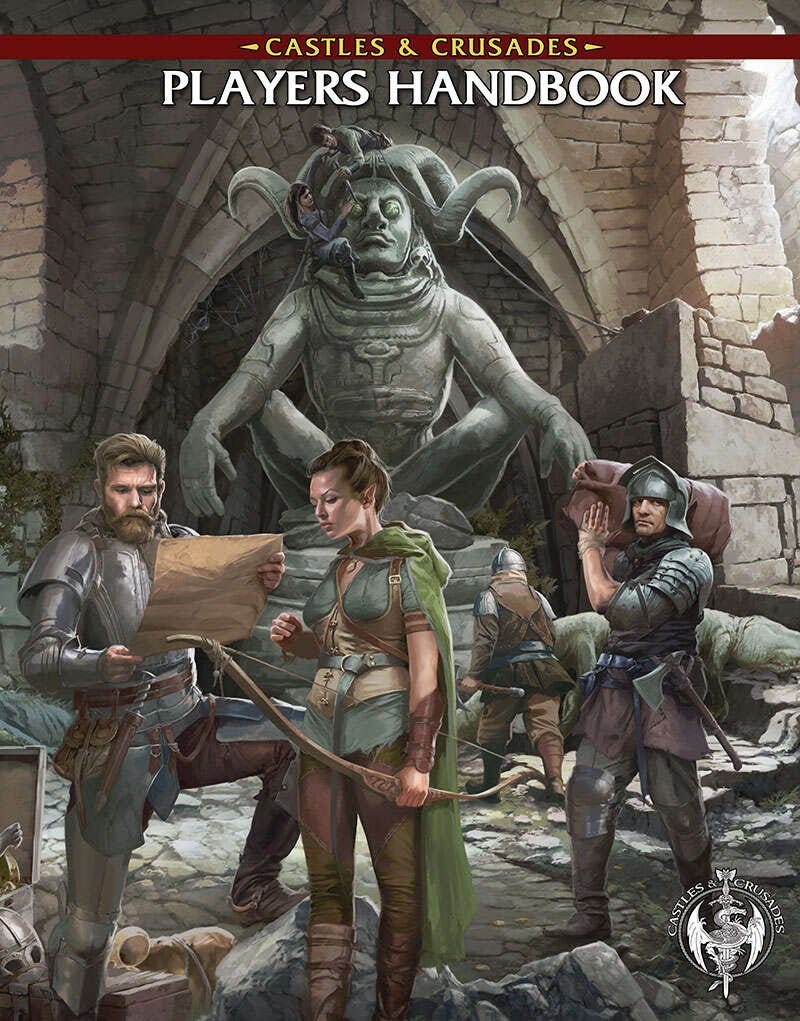The Economy of Abandonment by Davis Chenault from Troll Lord Games
Today I have something extremely special for you, we are still continuing the Economy in Fantasy Worlds topic, but today I have very first and special guest that wrote article for my blog, a feature that I wanted to bring with time and hope it will become a reoccurring feature on my Blog in future. With my deapes pleasure I would like to welcome Davis Chenault - one of the creators of Castles & Crusades, Amazing Adventures and publishers that bring us Gary Gygax's legendary dungeon "Castle Zagyg" that is still on
Backerkit and passed whooping $480.000!
, as our first ever Guest Writer on Elven Maid Inn X Blog!
You can download Castles & Crusades Free
and
from
Troll Lord Games Official Website!
Those dusty tombs, dank dungeons, airy keeps, and dark caves produce a staggering sum of gold, silver, and items of magical enchantment. The bread and butter for any adventurer to rearm, reequip, carouse in taverns, bribe officials, buy a castle, and mayhap even do some good by giving away some of their precious specie. And potentially wreck any semblance of a local or even regional economy.
Creating an in-game economy for a fantasy world, and most especially that of a tabletop roleplaying game, is a daunting task, with competing economic systems, theoretical approaches, the creation of markets and resources, and numerous other variables. It is, in short, no easy task and one not to be taken lightly or to be taken very lightly, as one chooses.
The Economy of Abandonment
by Davis Chenault
There is another economy to consider, one hidden in plain sight: the economy of abandonment. This is, for the most part, a meta-game economy and plays a more important role in a TTRPG than any economic system devised for barter, trade, taxing, or banking. If ignored, these two economies can clash and detract from the game’s goal, but if balanced properly, they bring more immersion to the game.
The economy of abandonment refers to two related pillars of the game’s architecture. The first pillar is the story and setting, and the second is reward and experience. More plainly, the abandoned places are where the adventurers and stories occur and from which experiences are extracted. These are the two most important economies in the game world and the primary two with which most players and game masters really concern themselves.
Those empty spaces—the unclaimed, the left behind—these are the areas for the player’s characters to explore. From tombs containing magical artifacts and dungeons overflowing with treasures to a lord’s vault and dragon’s lair, these places are empty until the characters fill them with their presence. These may contain some monstrous beasts to fight, obstacles to overcome, or evil characters to slay. They may take place in cities, forests full of hellish hounds, or dungeons full of dragons. What unites them is that the area they occupy is empty until the players enter it.
It’s all this unclaimed, the left behind, the empty spaces scattered around the game world—those places and settings the players have not yet visited—these are the abandoned places. These places yet experienced are the markets and the commerce of the game. This is its real economy. The players create characters to adventure in these places and craft stories to fill them with life. They exchange their time and their imagination to bring life to them. The players walk away with much from this exchange, this economy.
Another aspect of the economy is the tangible and intangible experiences the players and the players’ characters draw from the game. These players’ experiences are created through roleplaying, playing different characters, and engaging in meaningful tales, and they become better players. As importantly, the player’s character gains experience of a tangible sort from these adventures. Experience points are the goods the characters extract from their adventures and are used to level up a character, providing a concrete manner of expressing a player’s character’s increasing skills. Experience points are accessed through the adventure. How they are rewarded is a gaming economy that is controlled by the person running the game and can have an impact on play.
As an example of how this economy works, consider the following types of experience point rewards and how they affect play:
Early Game Rewards: In the early days of the game’s development, experience points were rewarded for killing monsters and by gold acquired. The experience points derived from gold were by far more economically valuable than those acquired by fighting. This encouraged a style of play whereby combat (which was deadly) was not the first course of action when confronted. If possible, combat was avoided to get the gold. Those early games rewarded a type of cunning roleplay that avoided combat. It was simply more economical to do so.
Combat-Driven Rewards: On the other hand, consider a situation where experience is only gained by defeating a foe or through fighting. This encourages the players to fight their way through confrontations in lieu of other solutions.
Milestone Rewards: Another method is a milestone award or a session reward. These offer experience after the completion of quests, goals, or any type of objective. This encourages the players to find a suitable method to achieve the end, supporting numerous play styles. However, the goals must be stated. This can interfere with player agency by reducing rewards for exploration of things outside the objectives.
There are more tangible in-game awards. This is the accumulated gold, silver, jewelry, weapons, magical items, and innumerable nick-knacks characters pick up on their adventures. These can be voluminous and worth a small or mighty fortune—a fortune greater than that of a barony, duchy, wealthy mercantile family, or perhaps even a kingdom. Imagine what might happen when that much gold is introduced into a local or even regional economy. A lot! It reminds me of the story of Mansa Musa, who crashed the Egyptian gold market in the 14th century when he came through on his way to Mecca. It can be managed, but that is an article for a different day, bearing in mind that treasure is not designed for in-game economies but rather as a reward for play.
This brings me to another tangential artifact to consider: the betwixt and between, the truly abandoned place of the in-game world. That place where there is no treasure to walk away with, there are no experience points to extract, there is little to discover, conquer, or quest to fill. These places offer a gold mine of opportunities for the players and ample room for immersive and unexpected play. I speak of the derelict keeps, lonely cottages, forgotten caves, deserted taverns, unclaimed lands, and more. The empty spaces, the real in-game abandoned places.
These are places yet claimed where nothing but the wind and the weather hold dominance. These aren’t just dressing and background ambiance; they are opportunities. Opportunities for the characters to explore a whole different aspect of the world they inhabit—ownership and a stake in the immediate. These are prizes: a treasure for the characters to hole up if necessary, a hideout while recuperating, somewhere to bury treasure, or rest and plan their next move. Even more, these places can become defensible bases or even homes to farm or merchant houses for trade. A tower for a wizard, a tavern for a bard, a keep for a knight, a house for a thief—all these offer opportunities for the characters to become a part of their world, enmeshed and entangled within it, and be a piece of the overall story of the world rather than actors acting on it.
Claiming these creates opportunities for the players to engage in the societies of the game world in a recurring and meaningful way—forming friendships and bonds with NPCs, or even engaging in mercantile activities if that is to their liking. But more importantly, once these places are inhabited by the characters, the places become abandoned places for the rest of the world to act on. This is a key component to bringing a setting to life. The characters are acted upon: their keep becomes a dungeon for other monsters, adventures for other heroes; a tavern could become a hive of villainy for a thief’s guild, or a wizard’s tower a school for other wizards.
The economy of abandonment is not about filling bags with gold coins, buying weapons and armor, or even generating experience points. This is the more subtle market of the game, one that is inextricably embedded into the core of the game. It is what makes the game what it is. This, the economy of the abandoned, is the one market that matters the most—not the day-to-day grind of buying, selling, trading, and valuating treasures and hordes. That is for the laborer, the toiling nameless background of the world.
Rethink the real treasure in the game and forget the math and embrace the quiet barter between the players and those empty spaces in the game, because it’s not points, scores, or gold that make the game—it is made through the interaction of the player with those abandoned places. So next time your party stumbles on a crumbling tower or a silent hamlet, don’t just roll for loot or monstrous encounters. Rather, ask: what’s been left behind, and what can we do with it? The economy of abandonment awaits.
------------------------------------------------------------------------------------------------------
Huge thank you to Davis Chenault from Troll Lord Games for taking time to write this amazing insight into Economy in Fantasy Worlds for us to enjoy. Let me also point one more thing, Davis did not request any promotion in this article, both shout-outs for Bracketkit for Castle Zagyg and Information about Free PDF for Castles & Crusades came from my own initiative, this only show how Davis and all people from Troll Lord Games are passionate about our hobby, and I struggle toe express how gratefull I am for this article and all work Davis, Steve, Chuck, Grace and every single person at Troll Lord Games is doing. Thank You! If you would like to write a Guest Article for Elven Maid Inn X Blog please feel free to contact me on X, Discord or via email: elvenmaidinn@gmail.com !





